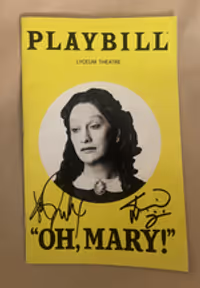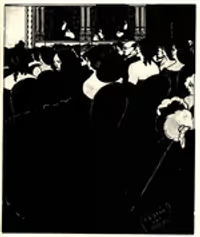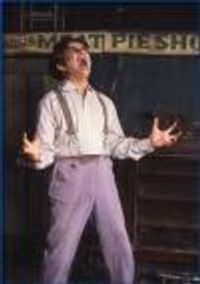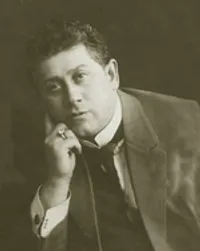HOW TO DANCE IN OHIO Opening Night Critics’ Reviews
emlo99
Chorus Member Joined: 11/23/23
#50HOW TO DANCE IN OHIO Opening Night Critics’ Reviews
Posted: 12/13/23 at 1:41pm
BoringBoredBoard40 said: “….this is a rush ticket, you are claiming to have invented a rush ticket...."
LOL.
I wish we could laugh react on Broadway World like they do on facebook.
hearthemsing22
Broadway Legend Joined: 2/14/20
#51HOW TO DANCE IN OHIO Opening Night Critics’ Reviews
Posted: 12/13/23 at 2:32pm
emlo99 said: "Ensemble1671017357 said: "decolonize theatre.
What is "decolonize theatre"????"
Each person has their own definition of what decolonizing means to them, but per one of Larissa Fasthorse’s interviews, it looks like part of her work is advocating for Native people to write and perform their own stories instead of non native people doing it, ie Disney romanticizing Pocahontas. For example, she talked about Tiger Lily being a bad example of Native representation. Quite like how I am disappointed in How To Dance in Ohio because two neurotypical people wrote the book and music, and they definitely didn’t do it as well as they could have if they had just had an autistic person write the book instead. Having an autistic consultant isn’t good enough, IMO."
A huge step forward for Broadway, and people just want to whine. Go for it. Doesn't change anything about that show.
#52HOW TO DANCE IN OHIO Opening Night Critics’ Reviews
Posted: 12/13/23 at 2:50pm
I saw this again last night, to see what changes had been made since the early preview I saw. I remember saying how I felt the main 7 in the group seemed almost like supporting characters to the adults and that no longer seemed to be the case, so I was happy to see they’d made those necessary cuts.
#53HOW TO DANCE IN OHIO Opening Night Critics’ Reviews
Posted: 12/15/23 at 12:44am
Saw this tonight and, in summary, “the road to hell is paved with good intentions”
It has good intentions, but hell if I’m going to recommend it to anyone.
As someone who is neurodivergent (not ASD), as well as a clinician and a musical theatre geek, there were A LOT of angles I could view this show from and unfortunately none of them were good.
From the clinical standpoint, it certainly cleared the very low bar set by that the godawful “Music” film that Sia made - but it seems like in trying to avoid potential pitfalls around the subject, it hit a very thin and wobbly middle line that sort of takes the most palatable aspects of an ASD presentation and makes a pretty package. While I wasn’t necessarily looking for anything overly dramatic, some of them more often felt coded as “quirky” and I needed the periodic reminder that they were indeed ASD.
I also could not STAND the Dr. Amigo character. He very much gave off the “inspirational inner city high school teacher” vibe in the beginning and he lost me immediately when he sold out his clients for the news coverage without their express consent- since that is a MAJOR violation of the patient/provider privilege and he even mentions that the dance is a therapeutic tool right before he compromises himself for the sake of good intentions and positive representation - which not surprisingly backfired and set up a heavy handed “nothing about us without us” moment in Act II. Him meddling on one of his student’s college prospects alone would probably qualify him to get his license revoked. And, personally, I felt like the show let him off way too easy (in a Dear Evan Hansen kind of way).
The musical aspects I found aggressively generic, to the point where everything started to blend and sound the same after a while (there were a lot of common motifs in the score) and the lyrics didn’t help matters by being a lot of basic AB rhyme. The sound design was absolutely terrible and even the big numbers sounded like they had a muffle on them (though I’m not sure if this was intentional to accommodate the ASD audience members who are noise-averse). I don’t fault any of the performers and I thought they were all excellent, especially the actors playing the parents because they didn’t act with their pearls clutched the whole time and seemed like real people.
Overall, this felt very much like a show that is so middle of the road in trying to please and comfort everyone and, personally, left myself and others around me mostly indifferent or bored.
#54HOW TO DANCE IN OHIO Opening Night Critics’ Reviews
Posted: 12/16/23 at 7:52pm
ErmengardeStopSniveling said: "darquegk said: "Maybe it also feels like a bit of a nothing burger in a season with HERE LIES LOVE, a really innovative and experimental show actually written by an openly neurodivergent artist and iconoclast."
I think this is a really good point.
Sometimes a more subtle approach is better.
We've had many other musicals written/directed/produced by/starring neurodiverse people, and centering around characters who are neurodivergent. The difference, of course, is that those artists haven't been "out" (or weren't diagnosed), and the stories have been more subtextual."
If you told me that the greatest polyglot genius of musical theatre had been neurodivergent, I'd immediately say "oh, in hindsight of COURSE he was." And if you told me that his famous musical about a friendly but emotionally detached bachelor struggling to make "normal" emotional attachments to other people and never knowing quite what to say when confronted with conflict or complications was ALSO about the neurodivergent experience, I'd immediately say "oh, in hindsight of COURSE it was."
#55HOW TO DANCE IN OHIO Opening Night Critics’ Reviews
Posted: 12/16/23 at 10:45pm
Am I the only person who, upon seeing anything related to this show, sings in their mind: "Oh, I wanna dance in Ohio!" Like the Whitney Houston Song,"I Wanna Dance With Somebody."
#56HOW TO DANCE IN OHIO Opening Night Critics’ Reviews
Posted: 12/17/23 at 4:21am
Mozart? Papageno? Magic Flute?
darquegk said:
If you told me that the greatest polyglot genius of musical theatre had been neurodivergent, I'd immediately say "oh, in hindsight of COURSE he was." And if you told me that his famous musical about a friendly but emotionally detached bachelor struggling to make "normal" emotional attachments to other people and never knowing quite what to say when confronted with conflict or complications was ALSO about the neurodivergent experience, I'd immediately say "oh, in hindsight of COURSE it was.""
#57HOW TO DANCE IN OHIO Opening Night Critics’ Reviews
Posted: 12/18/23 at 1:19pm
darquegk said: "We've had many other musicals written/directed/produced by/starring neurodiverse people, and centering around characters who are neurodivergent. The difference, of course, is that those artists haven't been "out" (or weren't diagnosed), and the stories have been more subtextual."
If you told me that the greatest polyglot genius of musical theatre had been neurodivergent, I'd immediately say "oh, in hindsight of COURSE he was." And if you told me that his famous musical about a friendly but emotionally detached bachelor struggling to make "normal" emotional attachments to other people and never knowing quite what to say when confronted with conflict or complications was ALSO about the neurodivergent experience, I'd immediately say "oh, in hindsight of COURSE it was.""
George Seurat in SITPWG is absolutely written as on the spectrum. I mean they could have called it Asperger’s: The Musical. Autism is better understood now, and receives more attention, but “high functioning” autistic people have been filling up the dramatic canon for centuries, as have great artists in all mediums.
hearthemsing22
Broadway Legend Joined: 2/14/20
#58HOW TO DANCE IN OHIO Opening Night Critics’ Reviews
Posted: 12/18/23 at 2:02pm
I'm glad you shared your opinion. I hope you don't feel it is the final say on the show and the bar at which all should expect going into it. Yours is one of many. When I saw it, people around me were crying. You're never going to get the same reaction and that is what is beautiful about theater. It can bore people- it can also truly touch them and make them feel seen onstage in a way they hadn't before.
KevinKlawitter
Broadway Legend Joined: 1/21/20
#59HOW TO DANCE IN OHIO Opening Night Critics’ Reviews
Posted: 12/18/23 at 6:49pm
Liam Pearce just posted some pics of himself and other cast members in a recording booth on his IG stories - looks like they're working on the Cast Recording!
GottaGetAGimmick420
Broadway Star Joined: 12/9/23
#60HOW TO DANCE IN OHIO Opening Night Critics’ Reviews
Posted: 12/18/23 at 7:08pm
Did anyone see all the drama on Twitter/X about the ticket initiative?
Edit: https://twitter.com/ItsRainingBen/status/1736843674737098903
#61HOW TO DANCE IN OHIO Opening Night Critics’ Reviews
Posted: 12/18/23 at 7:19pm
A big blunder on the part of Ben and his fellow lead producers if the press announcement was made prior to everything being approved and set up on the backend. There are multiple layers of people everything has to go through on Broadway before announcements are made.
This is also why producers shouldn't be their own mouthpiece...look how often Ken Davenport gets his own facts mixed up on his social & blogs.
emlo99
Chorus Member Joined: 11/23/23
#62HOW TO DANCE IN OHIO Opening Night Critics’ Reviews
Posted: 12/18/23 at 7:21pm
GottaGetAGimmick420 said: "Did anyone see all the drama on Twitter/X about the ticket initiative?
Edit:https://twitter.com/ItsRainingBen/status/1736843674737098903"
I mean.. yikes.
lol
I’m really curious to see if this show stays on through December
forfivemoreminutes
Featured Actor Joined: 9/24/21
#63HOW TO DANCE IN OHIO Opening Night Critics’ Reviews
Posted: 12/18/23 at 11:08pm
I really wanted to like this one, but it was a miss for me. I think the show does exactly what it claims to NOT do, which is to create a "feel-good," "inspiring" show geared towards neurotypical audiences, to show them that "autistic people are just like you!" For all that the show has done to make it accessible to autistic people (creating a cool down space in the theatre, hiring autistic actors and consultants, having the autistic actors come out to introduce the show at the beginning), it still seemed to be (as an autistic person) to be written and by and for family or friends of autistic people rather than autistic people ourselves. Part of that was due to the focus on Dr. Amigo, his love life, and his daughter (as other posters have noted), so we didn't get enough time with the autistic characters to see them as three-dimensional humans.
But I think the framing of the show itself is based on what neurotypical people want (or what they assume autistic people want, based on their own neurotypical lens). Some of this might be unavoidable given that it's based on a documentary - but the idea of a dance in itself seems like a neurotypical idea, i.e. that autistic people want or SHOULD want to do the same kinds of things as [many of] their neurotypical peers and that engaging in this "rite of passage" will help them in some way. Many autistic people would reject that framing. Most autistic people who don't go to dances (myself and many autistic people I know included) don't go for one of two reasons: a) they don't want to or b) the dances are not set up to accommodate their needs.
I would have been much more interested in the show if the dance had been suggested by one of the kids (e.g. "I wish I'd had an opportunity to do this, but my school dance wasn't accommodating to my sensory needs") rather than being suggested by Dr. Amigo - and when Dr. Amigo suggests it and the kids groan and say they don't want to do it, Dr. Amigo insists that it's a great idea, which again seems like forcing the kids to conform to neurotypical norms. I would have also been interested if the conversations about the dance had involved more of how to make the environment accessible for the autistic kids (e.g. less noise, cool down spaces, no strobe lighting, foods that are sensory friendly), rather than teaching the autistic kids how to change themselves for the dance.
I know some other posters here enjoyed the song the moms sing about how excited they are to see their daughters getting ready for the dance, but I found this song quite infantilizing and with a neurotypical framing; the moms want this for their daughters and there's no indication that the daughters want it for themselves (or if they did want it for themselves, why they haven't done it so far). We're supposed to feel like the moms would be "missing out" if they didn't get to have this moment with their daughters, but there's no indication from the show that the parents should spend more time appreciating the children they have rather than the children (and the milestones) they imagine having.
I would also have been more interested if the show had spent time explaining what the actual barriers were for the kids in going to their own school dances. Surely they weren't all going to alternative schools that didn't offer a dance (or if they were, this should be stated). If they didn't go to their school dances, there's a reason for that, and the way the dance came together with very few barriers beyond needing to learn how to dance and how to ask someone out was not realistic for me.
Cards on the table: I didn't go to any of my school dances (and my school held multiple dances every year for every grade, plus a prom in senior year). And I missed out on nothing; I don't regret not going or feel like I missed a major life milestone, and I don't think my parents feel like they missed out on the opportunity to buy me a dress or take pictures of me with a date or anything like that. My life has been completely fine; I've gotten two graduate degrees, I'm the Executive Director of a bi-national nonprofit, etc. My life was not ruined by missing my prom, and people in my life putting pressure on me (even implicitly) to attend a dance just would have made me unhappy and uncomfortable.
Anyway, the reasons I never attended a school dance were: I didn't like dancing, I didn't like crowds, I didn't like loud music, I didn't like bright or flashing lights, I didn't like staying out late, I didn't like other people getting sweaty anywhere near me, I didn't like wearing any shoes except running shoes (which I wouldn't have been comfortable wearing to a dance), I didn't like wearing strapless or low cut dresses (and it was surprisingly difficult for me to find a sufficiently modest but still "fancy" dress for my graduation), I didn't like buying new clothes, and I didn't like most of the fabrics dresses were made of. I guess the show kind of nodded at one of these reasons with Meredith not liking zippers on dresses, which I think was the thing they got the most right in the entire show, but with Jessica and Caroline going to the mall to get new dresses, I got no sense of why they had never gone to a dance before, since all of the things that would have been barriers for me or other autistic people I know just seemed fine for them. They were fine at a crowded probably very loud mall; they had no problem trying on multiple outfits (which is something I and many autistic people I know hate); they had no problem with fabrics or zippers or buttons or seams or straps or the dresses being too tight or too loose or hanging weirdly; they had no problem with finding comfortable shoes (which is something I and many autistic people I know struggle with a lot), they had no problem figuring out who they wanted to ask to come to the dance with them...as an autistic person, this scene felt very unrealistic.
In general, I felt like the autistic characters were portrayed as simultaneously hyper-competent and completely incompetent. The autistic characters are all clearly very smart, but the way the adults in their lives treat them is infantilizing and assumes a lack of competence (e.g. the constant instructions on social interactions the characters get). In my experience as an autistic person, the issue isn't usually that the autistic person needs lots of direction on how to act socially; the issue is that neurotypical people think very differently than autistic people, so autistic people might need encouragement in advocating for themselves, e.g. the situation with Mel and their boss, where Mel wants to be told things directly and the boss assumes Mel will just know things without him having to say it. This is called the double empathy problem, where neurotypical people struggle to understand autistic people and vice versa, because their brains work differently. I wish the show had delved more into this issue rather than setting the autistic characters up as the ones who need to be told how to behave by everyone in their lives (especially their parents).
Like I said, I really wanted to like this show, and I really wanted to be happy to see autistic representation on stage. But for a show that literally has a character sing about how their job isn't to be an inspiration to neurotypical people, it seems like it's doing a lot of that itself, and to me as an autistic person, that didn't feel very good. I wonder how a show written by actually autistic people might look different.
#64HOW TO DANCE IN OHIO Opening Night Critics’ Reviews
Posted: 12/18/23 at 11:49pm
forfivemoreminutes' post helped me articulate one of the issues I've been thinking about: it seems to be written from the outside-in, instead of from the inside-out. It's being driven by "look at these autistic characters" instead of "we are telling a character story and the characters happen to be autistic." We rarely see inside their minds, which could have been the most interesting way to use the MT artform: let us perceive them in our world, AND THEN let us see the world as they see it. Which feels like the type of idea Hal Prince might have latched on to as a concept musical, but is clearly not explored here as a rigid book musical. It might have helped the characters seem less generic, less boringly high-functioning.
It also looks awful, from the blocking to the choreo (or lack thereof) to the brightly saturated design. But a wholly different staging and physical production would only solve like 20% of this show's problems.
forfivemoreminutes
Featured Actor Joined: 9/24/21
#65HOW TO DANCE IN OHIO Opening Night Critics’ Reviews
Posted: 12/19/23 at 12:04am
ErmengardeStopSniveling said: "forfivemoreminutes' post helped me articulate oneof the issues I've been thinking about: it seems to be written from the outside-in, instead of from the inside-out. It's being driven by "look at these autistic characters" instead of "we are telling a character story and the characters happen to be autistic." We rarely see inside their minds, which could have been the most interesting way to use the MT artform: let us perceive them from the outside, AND THEN show us the inside of their minds. Which feels like thetype of idea Hal Prince might have latched on to as a concept musical, but is clearly not explored here as a rigid book musical. It might have helped the characters seem less generic, less boringly high-functioning.
It also looks awful, from the blocking to the choreo (or lack thereof) to the brightly saturated design. But a wholly different staging and physical production would only solve like 20% of this show's problems."
For me it wasn't that the characters are too high-functioning, but high-functioning in the wrong ways (high-functioning isn't a term most autistic people like, but I'm using it to make my comment make sense). Like, I'm high-functioning myself in many ways; I live by myself and have since I was 18, I have a well-respected job that pays well, I have two graduate degrees from prestigious universities, I travel a lot on my own, I have lots of friends, etc. But I also get very anxious about buying new clothes or new shoes (textures, fabrics, seams, getting used to how new things feel); it takes me forever to tie my shoes because they're always either marginally too tight or marginally too loose; I get super overwhelmed by public bathrooms; I won't eat any foods with a watery or lumpy texture; I sometimes say things "too bluntly" (too bluntly for neurotypical people, but just the right amount of bluntness for other autistic people) and I've lost or quit several jobs because of that; I can't handle other people chewing gum near me because the sound drives me crazy, etc. These kinds of things that are so central to most autistic people's lives and experiences of the world were mostly glossed over in the show, except for some minor "quirks."
What I felt with this show is that the characters were high-functioning in the exact opposite ways as me and many autistic people I know; they could "act neurotypical" to varying degrees (e.g. going to this dance, not being bothered by clothing textures) but could not succeed in social situations without their parents' help, because the show posits that THEY are the problems (and their lack of social skills) rather than understanding their unique needs and communication styles and how maybe the rest of the neurotypical world needs to adapt to them. My own life started getting a lot better when I decided to start adapting my world to me rather than forcing myself to adapt to a world not made for me. I really wish the show had emphasized this message more, because I think both autistic and neurotypical people need to hear it.
#66HOW TO DANCE IN OHIO Opening Night Critics’ Reviews
Posted: 12/19/23 at 12:05am
Wonderfully expressed views, forfivemoreminutes. Thank you for sharing them all. I can see exactly what you mean while I think back on seeing this show a few days ago.
I really think that the adults are far too present in the plot, despite whatever cuts have been made. The show is easily 30 mins too long. That stuff with the reporter in the bar shouldn’t have even made it into rehearsal, and Caesar has my sympathy for having to deliver all those terrible lines with a straight face.
Speaking of Caesar, I’d never heard him sing before (my memory of CFA is that we didn’t hear many solos besides a few key roles) and he reminds me of Kevin Grey, as in: an interesting sound, but not really that nice to listen to for a long duration, perhaps.
Not sure how to phrase this, but I’ll try, and bear with me: We have autistic actors playing the autistic roles. If there is a case where one of the characters displays more heavily “autistic” behavior than the actor playing the role displays in their real life (like Marideth “seemed to” throughout, or when the leading male became emotional/less communicative about the college acceptance stuff), isn’t that just the same as having a non-autistic person in the part?
If they’re being asked to “amp it up!” by the director, then they’re essentially now playing something that they’re not. Or does the “authenticity” convention get a near-enough-is-good-enough pass here, like Filipinos playing Vietnamese?
As the actor states at the beginning, “If you’ve met one autistic person, you’ve met one autistic person.” The audience chuckled. They were on board. But it seemed to me that we were meeting autistic people who were playing their/the authors’/the director’s perceived degrees of their characters’ autism. So were we meeting any autistic people… at all?
forfivemoreminutes
Featured Actor Joined: 9/24/21
#67HOW TO DANCE IN OHIO Opening Night Critics’ Reviews
Posted: 12/19/23 at 12:17am
BorisTomashevsky said: "Not sure how to phrase this, but I’ll try, and bear with me: We have autistic actors playing the autistic roles. If there is a case where one of the characters displays more heavily “autistic” behavior than the actor playing the role displays in their real life (like Marideth “seemed to” throughout, or when the leading male became emotional/less communicative about the college acceptance stuff), isn’t that just the same as having a non-autistic person in the part?
If they’re being asked to “amp it up!” by the director, then they’re essentially now playing something that they’re not. Or does the “authenticity” convention get a near-enough-is-good-enough pass here, like Filipinos playing Vietnamese?"
This is complicated, because I think part of it is, they're acting - they're not playing themselves, but a character. I think in some ways this is similar to the actor (whose name I forget, I'm sorry) in Cost of Living last year who was playing a character with cerebral palsy; the actor's CP was much less severe than the character's (the actor can dress himself, bathe himself, etc), but it was still authentic casting. So that's part of it. But the other part is that autism is complicated and it doesn't always show up the same way in different situations. So it's possible that the aspects that these actors are portraying are true to their own experiences, at least in some circumstances. Speaking for myself again, I can run a Board meeting or make a presentation to a government body with no problem and no anxiety, but I've had meltdowns that made me practically nonverbal at airports due to overstimulation, and I've gotten fired from or quit jobs because of autistic to neurotypical communication difficulties. I get super anxious meeting new people in unstructured social settings, but I have basically no anxiety about meeting new people in structured settings like work or school. I've gotten overwhelmed and run out of events before, but not always the ones I would have predicted. All of which to say, autism can be more than one thing at once, and it's possible that the characters the actors are portraying are more "authentic" than they seem - but even if they aren't completely authentic, I think there's something to be said for Acting. :)
forfivemoreminutes
Featured Actor Joined: 9/24/21
#68HOW TO DANCE IN OHIO Opening Night Critics’ Reviews
Posted: 12/19/23 at 12:20am
BorisTomashevsky said: "As the actor states at the beginning, “If you’ve met one autistic person, you’ve met one autistic person.” The audience chuckled. They were on board. But it seemed to me that we were meeting autistic people who were playing their/the authors’/the director’s perceived degrees of their characters’ autism. So were we meeting any autistic people… at all?"
I also completely agree with this. That's what felt so off about the show to me - it felt like the autistic actors were playing autistic characters *as neurotypical people imagine them* (I guess as "enlightened, progressive" neurotypical people imagine them). It did not feel like watching real autistic people with their talents and smarts, yes, but also with all the day-to-day little things that autistic people encounter in the world.
forfivemoreminutes
Featured Actor Joined: 9/24/21
#69HOW TO DANCE IN OHIO Opening Night Critics’ Reviews
Posted: 12/19/23 at 12:36am
Last thing I'll say (for now) - I wish the show had done more to demonstrate what actual accommodations for autistic people can look like. It did this a little with AAC, but that plotline was dropped pretty quickly. One place I wish they'd done this was when Maridith said her dad wants her to go to the diner with him but she doesn't like that the bell the diner rings. This would have been a good place to a) validate that it's completely fine for Maridith to not like the ringing bell and b) problem solve with her! Can she ask them to not ring the bell while she's there? Can she sit far away from the bell? Is there another diner that she could go to with her dad that doesn't have a ringing bell? Could someone who works at the diner warn her when they're going to ring the bell so she can cover her ears or put on headphones? The solution the show seemed to suggest was "Maridith just has to deal with it, because it will make her dad happy," rather than "Maridith can ask for accommodations and advocate for herself." The show seemed pretty focused on teaching autistic people how to fit into the neurotypical world rather than on teaching autistic people that their needs are valid and here's how to advocate for yourself (insofar as it showed autistic people having unique needs at all).
#70HOW TO DANCE IN OHIO Opening Night Critics’ Reviews
Posted: 12/19/23 at 12:46am
forfivemoreminutes said: "I wonder how a show written by actually autistic people might look different."
Rebekah Greer Melocik has Tourette syndrome (which makes her neurodivergent), and Jacob Yandura’s sister is autistic, per the NYT.
forfivemoreminutes
Featured Actor Joined: 9/24/21
#71HOW TO DANCE IN OHIO Opening Night Critics’ Reviews
Posted: 12/19/23 at 1:03am
EDSOSLO858 said: "forfivemoreminutes said: "I wonder how a show written by actually autistic people might look different."
Rebekah Greer Melocik has Tourette syndrome (which makes her neurodivergent), and Jacob Yandura’s sister is autistic, per the NYT.
"
Having an autistic sibling is different than being autistic yourself, and might explain the lens the show takes that seems much more like a family member’s POV than an actually autistic person’s. Tourette’s and autism, while both neurodivergences, are very different experiences. As an autistic person, I would not consider myself qualified to tell a story about a person with Tourette’s without a lot of research (which I’m not saying the creatives didn’t do; more just saying these two things are not interchangeable and being knowledgeable about one doesn’t make you knowledgeable about the other).
#72HOW TO DANCE IN OHIO Opening Night Critics’ Reviews
Posted: 12/19/23 at 2:14am
EDSOSLO858 said: "fRebekah Greer Melocik has Tourette syndrome (which makes her neurodivergent), and Jacob Yandura’s sister is autistic, per the NYT."
I went back to read the article you're referencing and was struck by a different section.
Apparently the reason the real Dr. Amigo and his wife got divorced, which was presented as an unknowable mystery in the musical, was because he came out as gay. I get that he didn't come out until after the events of the documentary, but I think it was a real mistake not folding that into the musical.
It fits better into the musical's focus of trying to figure out how to present your authentic sense to the world, and it would have saved us from the much maligned scene where he tries hitting on the reporter.
hearthemsing22
Broadway Legend Joined: 2/14/20
#73HOW TO DANCE IN OHIO Opening Night Critics’ Reviews
Posted: 12/19/23 at 9:31am
I appreciate everyone who has shared more information about their experiences. I hope they can also acknowledge that is your experience, and your experience is not the same as anyone elses. It may be similar, but not the same. And this musical is a huge step forward. So say what you like but don't tell people not to see the show. You're doing a disservice to people who will see some of themselves on the stage in a way that they didn't before. That is truly important.
KevinKlawitter
Broadway Legend Joined: 1/21/20
#74HOW TO DANCE IN OHIO Opening Night Critics’ Reviews
Posted: 12/19/23 at 9:43am
Jonathan Cohen said: "EDSOSLO858 said: "fRebekah Greer Melocik has Tourette syndrome (which makes her neurodivergent), and Jacob Yandura’s sister is autistic, per the NYT."
I went back to read the article you're referencing and was struck by a different section.
Apparently the reason the real Dr. Amigo and his wife got divorced, which was presented as an unknowable mystery in the musical, was because he came out as gay. I get that he didn't come out until after the events of the documentary, but I think it was a real mistake not folding that into the musical.
It fits better into the musical's focus of trying to figure out how to present your authentic sense to the world, and it would have saved us from the much maligned scene where he tries hitting on the reporter."
I wonder if one of the issues with the writing (as much as I liked the show I know there are flaws in it) is that the show looks at its characters with overall sensibility of the documentary's 2015 setting while being set (presumably) in the modern day of 2023. Eight years is a long time in terms of social progress, so there's a bit of a mishmash in the show between how the characters on the autism spectrum and LGBT people are described then and now. Maybe it should have remained a period piece, maybe with an epilogue or framing device set in the modern day.
Videos










